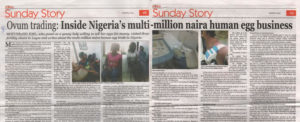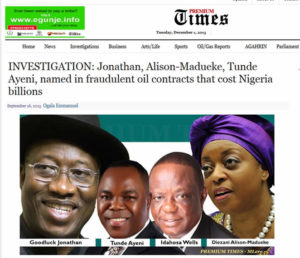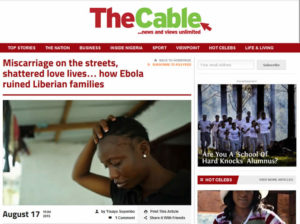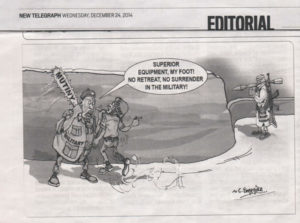WOLE SOYINKA AWARD FOR INVESTIGATIVE REPORTING
Winning Works 2015
Share this
Winner: Adekunle Yusuf
 How Leadership, Corruption, Hamper NDLEA’s Drug War, is a three-part story by Adekunle Yusuf published on Thursday 6, Friday 7 and Monday 10, August, 2015 by the Nation Newspaper. The story highlights multiple challenges facing the National Drug Law Enforcement Agency, NDLEA, including corrupt practices by its officials which helps offenders to escape judgment, thereby keeping drug cartels strong.
How Leadership, Corruption, Hamper NDLEA’s Drug War, is a three-part story by Adekunle Yusuf published on Thursday 6, Friday 7 and Monday 10, August, 2015 by the Nation Newspaper. The story highlights multiple challenges facing the National Drug Law Enforcement Agency, NDLEA, including corrupt practices by its officials which helps offenders to escape judgment, thereby keeping drug cartels strong.
While discreetly investigating, Adekunle Yusuf mingled with top officials of the NDLEA for over two years to unearth the corruption in the agency. In his report, Yusuf named names and gave specific background to various unethical practices plaguing the agency. Just as most investigative reports lead to denial of the story or threats to the reporter, some officials of the NDLEA attacked him through other print newspapers in an effort to suppress the effects of the story. Despite that, this report led to further television broadcasts about the agency where Adekunle Yusuf was invited to discuss the issues on air.
Runner up: Motunrayo Joel
 The trade of ovum is as rife in Nigeria as it may be in other parts of the world. Motunrayo Joel, a reporter with Punch Newspaper went hunting for a story that tells us that much.
The trade of ovum is as rife in Nigeria as it may be in other parts of the world. Motunrayo Joel, a reporter with Punch Newspaper went hunting for a story that tells us that much.
Ovum Trading: Inside Nigeria’s multi-million naira human egg business, a piece published on Sunday, 9 August, 2015, tells the tales of poor young girls between the ages of nineteen and twenty-five who go through physical and emotional pain selling their eggs for the sum of N120, 000.
To get the story, Motunrayo disguised as an ovum seller; walking through the back door as directed by the nurse on duty, partaking in blood tests, infection screenings, ovarian scans and more, until she got the fertility drugs the young ladies inject themselves with to be able to produce maximum number of eggs for their trade. Although the National Health Act (2014) is silent about the prohibition or otherwise of human eggs, experts have decried the trend because of its implications for the human body. Motunrayo’s piece sets off an alarm to all on the inhumanity, manipulation and corruption that goes on the multi-million naira trade.
Winner: Ogala Emmanuel
 Investigation: Jonathan, Alison-Madueke, Tunde Ayeni, named in fraudulent oil contracts that cost Nigeria billions, a piece by Ogala Emmanuel, shows the reporter’s doggedness as well as it brought secret illegal activities within the source of Nigeria’s wealth to lime light.
Investigation: Jonathan, Alison-Madueke, Tunde Ayeni, named in fraudulent oil contracts that cost Nigeria billions, a piece by Ogala Emmanuel, shows the reporter’s doggedness as well as it brought secret illegal activities within the source of Nigeria’s wealth to lime light.
The story, published on Premium Times on Wednesday 16 September 2015, paints the picture of deeply entrenched corruption in the Nigerian National Petroleum Company (NNPC) and its contractors on the implementation of transporting crude oil by ships.
Although requests for information was turned down by the NNPC bosses, Ogala Emmanuel was able to reach out to insiders in the company and produced a well researched and informative report involving the former president of Nigeria, Goodluck Jonathan, the former Minister of Petroleum, Dieziani Alison-Madueke and others.
According to Ogala’s story, the contractors pocketed hundreds of billions from the NNPC monthly over a period of five years. He explained the events leading to these activities so clearly and in an easy to understand fashion that even a lay man would exclaim with awe at the level of corruption. According to the Judges, the story is a Pandora’s Box of the illegality that characterises the Nigerian National Petroleum Company and its management of the nation’s oil industry.
Runner up: Fisayo Soyombo
 Fisayo Soyombo believes that journalism is not just a profession but a calling. In his words, it is a viral instrument of enhancing and propagating democracy. This belief has been displayed by his dedication to investigative journalism. His three part report, Ebola in Liberia, details the physical and psychological pain victims of the Ebola virus and health workers had to pass through to survive in the face of gross embezzlement of the Ebola Funds by their government.
Fisayo Soyombo believes that journalism is not just a profession but a calling. In his words, it is a viral instrument of enhancing and propagating democracy. This belief has been displayed by his dedication to investigative journalism. His three part report, Ebola in Liberia, details the physical and psychological pain victims of the Ebola virus and health workers had to pass through to survive in the face of gross embezzlement of the Ebola Funds by their government.
Fisayo brings back memories of Liberia where the scourging effect of the epidemic spread to many other countries, including Nigeria. Fisayo’s bravery took him to Liberia amongst the Ebola victims despite the risk of contracting the virus. The stories which were published on the Cable, an online news media, on 17th, 21st and 27th August ,2015, gave a new perspective to the reports of Ebola victims which led to more questions on the assumed efforts of the Liberian government in curbing the crisis.
Winner: Ikechukwu Ibe
 Soldiers punish a civilian at Mararaba, Nasarawa State by Ikechukwu Ibe published by Daily Trust Newspapers on the 10th of August, 2015 is as vivid as it is unnerving. The culprits again, are representatives of the Nigerian Security forces – soldiers! The stick and horse whip are regularly deployed on Nigerians by the people empowered to protect them from arm. Ikechukwu’s piece is another evidence of the inhumanity of these men in uniform and their brashness with unleashing terror on mostly helpless civilians.
Soldiers punish a civilian at Mararaba, Nasarawa State by Ikechukwu Ibe published by Daily Trust Newspapers on the 10th of August, 2015 is as vivid as it is unnerving. The culprits again, are representatives of the Nigerian Security forces – soldiers! The stick and horse whip are regularly deployed on Nigerians by the people empowered to protect them from arm. Ikechukwu’s piece is another evidence of the inhumanity of these men in uniform and their brashness with unleashing terror on mostly helpless civilians.
Ikechukwu took great risks to have taken the picture. At the time of publication, the photograph went viral on the internet and social media. It attracted lots of comments and criticism from local and international audiences.
Runner up: Odusanya Odutayo Adedayo
 Nigeria’s educational system is on the red alert! Adedayo Odunsanya’s photo story, Double Jeopardy reminds us of this fact. The story, published in The Punch of Saturday 21 March, 2015 tells the story of neglect of education by the nation’s leaders with students having the sky as their classroom roof while sandwiched between a heap of refuse and a cemetery oozing with stench.
Nigeria’s educational system is on the red alert! Adedayo Odunsanya’s photo story, Double Jeopardy reminds us of this fact. The story, published in The Punch of Saturday 21 March, 2015 tells the story of neglect of education by the nation’s leaders with students having the sky as their classroom roof while sandwiched between a heap of refuse and a cemetery oozing with stench.
Winner: Asukwo Etim Bassey
 Chasing Shadows is an editorial cartoon that speaks for itself. The work, published in the Business Day of Tuesday July 14, 2015, narrates the irony of motion without movement of Nigeria’s anti-corruption agencies – the Independent Corrupt Practices Commission (ICPC), and the Economic Financial Crimes Commission (EFCC). The fight for corruption has been on for a long time in Nigeria with very little results to show. There have been numerous media buzzes on invitations for questioning, law suits, court hearings but scanty convictions.
Chasing Shadows is an editorial cartoon that speaks for itself. The work, published in the Business Day of Tuesday July 14, 2015, narrates the irony of motion without movement of Nigeria’s anti-corruption agencies – the Independent Corrupt Practices Commission (ICPC), and the Economic Financial Crimes Commission (EFCC). The fight for corruption has been on for a long time in Nigeria with very little results to show. There have been numerous media buzzes on invitations for questioning, law suits, court hearings but scanty convictions.
According to the judges, ‘the cartoon captures the contemporary public perception of the anti-corruption agencies. It provides effective contrast of the two agencies whose combined effort pale into insignificance against the threat of corruption’.
Runner up: Emenike Cornelius Chukwuemeka
 Emenike Cornelius Chukwuemeka’s piece, No retreat, no surrender, published in the New Telegraph Newspapers of Wednesday 24 December, 2014 was inspired by the news of soldiers accused of mutiny for rebelling against their superior during one of the heights of attacks by the Boko Haram sect in Northern Nigeria.
Emenike Cornelius Chukwuemeka’s piece, No retreat, no surrender, published in the New Telegraph Newspapers of Wednesday 24 December, 2014 was inspired by the news of soldiers accused of mutiny for rebelling against their superior during one of the heights of attacks by the Boko Haram sect in Northern Nigeria.
The reporter told all sides of the story, reflecting the argument of inadequacy of equipments for Nigerian soldiers raised by some, the superiority of equipments used by the sect raised by others, as well as the full loyalty to the country and superiors despite all odds expected from the mutinying soldiers by the Nigerian Army’s code of conduct.
Winner: Sumner Shagari Sambo
Over hundred persons were killed by armed invaders along the border communities between Kaduna, Katsina, Zamfara and Sokoto states of Nigeria. Many of them were burnt to death. Others, were shot dead. Initially, the belief was that the killings were as a result of the activities of the Boko Haram sect. Eventually, it was confirmed that yet another notorious group, the cattle rustlers, had chosen to take advantage of the dread the sect had caused to perpetuate wickedness.
Sumner Sambo tracked the activities of the group and reported it through his media house, Television Continental with his story Cattle Rustling in Northern Nigeria on October 30, 2014. According to his report, armed cattle theft has become a past time in the Northern area of the country. Importantly, Sumner established that the criminals behind cattle rustling were hardly always ‘Fulani’ as widely reported. In fact, a number of Fulani herdsmen are also affected by the activities of the criminals who engage in cattle rustling.

